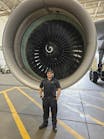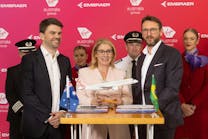FACC Supplies 1,000th Translating Sleeve Shipset for Airbus A350
After an exceptional 2020, the aircraft industry is making a swift recovery. Following China, air traffic in the US increased significantly in the last six months and is now only 15 percent below the record level of 2019. FACC is also benefiting from this trend, with demand for new short and medium-haul aircraft up by 20 percent in the fourth quarter of 2021. In the long-haul aircraft segment, FACC is celebrating a milestone: the aerospace group recently delivered the 1000th shipset of translating sleeves for the A350 to its customer Collins Aerospace.
The Airbus A350 ranks among the most advanced and efficient aircraft on the market. Lightweight composite components account for 50 percent of the aircraft's weight. This explains why the A350 consumes 25 percent less fuel than its predecessors - but that is not all: the A350 is also up to 60 percent quieter.
“With our years of know-how, we can provide both greater efficiency and lower noise emissions. This is our contribution to making flying more sustainable,” enthuses Robert Machtlinger, CEO of FACC.
In order to occupy a strong market position as a pioneer in this field, the international aerospace group relies on cutting-edge technologies and innovative manufacturing concepts.
"The first lightweight components for the translating sleeves of the Airbus A350 were delivered in 2010. Eleven years later, we are very proud to be able to deliver the 1,000th translating sleeve shipset to our long-standing customer Collins Aerospace," emphasizes Machtlinger.
This success was not achieved overnight: since the beginning of the project, FACC has invested approximately 50 million euros in the development and production of the components in order to offer Collins Aerospace and Airbus a translating sleeve that is as lightweight and fuel-efficient as possible while gearing the production line towards maximum efficiency and ergonomics. Around 50 employees are currently working on the program.
"The long-haul segment is developing with a slight lag compared to the short and medium-haul segment, but we expect the demand for A350 aircraft to continue to rise as the restrictions on transcontinental travel are gradually lifted," explains Machtlinger.
Innovative design with technologies of the future
Worldwide, an aircraft with FACC technology on board takes off every second. The components supplied by FACC are the translating sleeves for the Airbus A350 family, which are the main components of the thrust reverser. In addition to the outer parts of the thrust reverser and the movable blocker doors, they also contain the mechanical connecting elements required to operate these panels. Alongside the wing spoiler and the landing gear brakes, the thrust reverser is the third component in the brake system of modern commercial aircraft.
Faster, lighter, more environmentally friendly
In this project, FACC has tailored the production line of lightweight components at Plant 4 in Reichersberg (Austria) towards maximum efficiency and, together with its customer Collins Aerospace, has incorporated technological innovations into the design of the translating sleeves. The use of newly developed composite materials generates considerable weight savings, which in turn result in lower fuel consumption and a significant reduction in CO2 emissions. At the same time, special acoustic treatment of the components means that significant noise emissions are directed from the engines to the exterior.
“This anniversary delivery is a valuable confirmation of the excellent cooperation with Collins Aerospace. I would like to thank our long-standing customer for their trust, and the FACC project team for their great commitment and dedication throughout the entire project,” says Robert Machtlinger.



